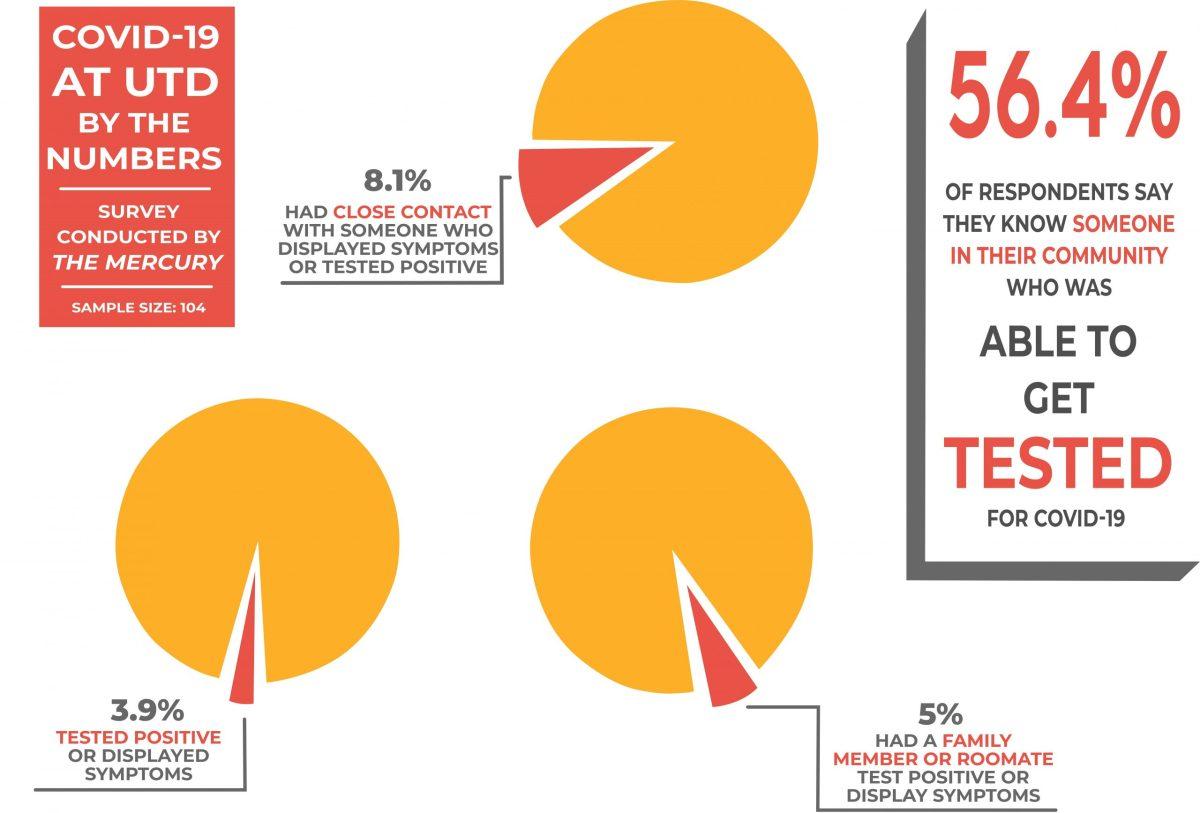Survey conducted, student discusses her experience with coronavirus
After UTD’s campus closed and students left to slow the spread of the novel coronavirus, a Mercury survey found that some members of the UTD community went on to test positive.
The survey, which received 103 responses, showed that four respondents tested positive or displayed the symptoms of COVID-19, which include dry cough, fever and difficulty breathing in severe cases. Of these four people, one tested positive or displayed symptoms 14-21 days ago, two tested positive or displayed symptoms over 21 days ago and one declined to respond.
Information technology and systems senior Hadia Zahid, along with her brother and sister, displayed symptoms of COVID-19. Zahid’s sister went on to test positive. Zahid’s symptoms included shortness of breath, loss of smell and taste, fatigue and cough.
“There’s a lot of stories about the different symptoms you can have and there (are) a lot of people being hospitalized. Me, my brother and my sister, we had all those symptoms, but it wasn’t enough for us to be hospitalized,” Zahid said. “I had shortness of breath for a couple of days (…) where I couldn’t breathe properly. But it wasn’t to a point where I was struggling to breathe. It was only a struggle for me to breathe if I was talking.”
Five respondents reported having family members or roommates test positive or display symptoms of the virus. This was the case for Zahid, who caught the virus from her sister. Zahid’s older sister is a resident at a Michigan hospital.
“There was a patient who had (COVID-19) and she wasn’t the original doctor on staff, but she had to be brought in because this situation had arisen,” Zahid said. “She had to go in and didn’t have the proper material because she wasn’t the doctor who was supposed to be handling that person originally. She didn’t have the proper face mask and gloves. She had to do chest compressions on the person, which is how that transfer happened. Then I think a day or two later, she started having fevers and coughs.”
8.1% of respondents said they had come into close contact with someone who had tested positive or displayed symptoms. Zahid’s sister and family immediately self-quarantined, which prevented them from spreading the virus to others, but didn’t stop Zahid herself and her brother from catching the virus.
“(My sister) was self-quarantined in her room,” Zahid said. “My parents quarantined, essentially downstairs. All of us would kind of be downstairs or upstairs, but she had to get food, you know, so that’s where me and my brother kind of came into play. We would go and give her food and honestly, we would try to keep a distance or avoid contact. But at some point, there was contact, which is how it passed.”
The survey showed that 56.4 percent of respondents were aware of people in their community or workplace who were able to get tested. According to a coronavirus tracker from Johns Hopkins University, there are over 2,800 cases in Dallas County and over 23,900 cases in Texas.
“If someone in your house does get it, I definitely think there (should be) kind of a plan in motion about how are you going to get food to the person,” Zahid said. “I think my siblings took it very lightly. Thankfully (…) it wasn’t too serious for any of us to be hospitalized, but it definitely knocks you out.”





